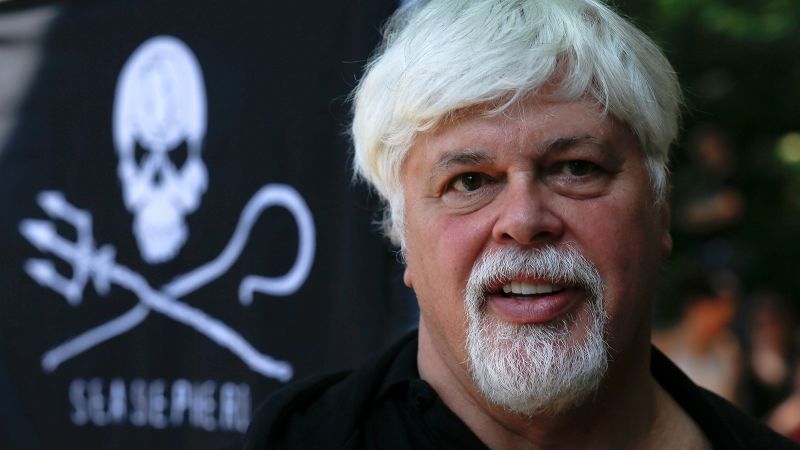Markus Schreiber/AP
Paul Watson, founder and chairman of Sea Shepherd, an animal rights and environmental organization, in Berlin, Germany, May 23, 2012.
CNN
—
Veteran environmental activist Paul Watson was arrested in Greenland on Sunday and may face extradition to the United States. Japan In a statement, his group said the lawsuit was filed over anti-whaling activities in Antarctica several years ago.
According to the Captain Paul Watson Foundation (CPWF) and Greenlandic police, the 73-year-old Canadian-American dual national was detained by police when the ship docked in Greenland’s capital, Nuuk, to refuel.
The John Paul DeJoria and its 25 crew members were en route from Dublin, Ireland to the North Pacific when they intercepted Japan’s newly launched $48 million whaling ship. Kangei Maru, CPWF said.
“We were quickly boarded by SWAT teams and police, and at the request of Japan, based on a decades-old red notice, they quickly handcuffed and arrested our founder, Paul Watson,” Rocky McLean, director of ship operations, said in a video message aboard the John Paul DeJoria.
The video shows police boarding the boat and taking Watson away in handcuffs.
Greenland police said in a statement that Watson was arrested on arrival in Nuuk on a Japanese arrest warrant. Police added that Watson had requested that he be detained pending a decision on his extradition to Japan and would be taken to a local court.
The foundation said it believed the arrest was “related to an earlier red notice issued to Watson for his anti-whaling activities in the Antarctic.”
“This development is surprising as the Foundation’s lawyers had reported that the red notice had been withdrawn, but it appears that Japan kept the notice secret in order to facilitate travel for the purpose of Paul’s arrest,” the statement continued.
“We believe the re-issuance of the Red Notice against Captain Watson is politically motivated and coincides with the launch of a new factory ship,” CPWF said.
The Japan Coast Guard told CNN it was aware of the statement made by Greenland police about Watson, and would “continue to respond appropriately in coordination and cooperation with relevant agencies.”
Interpol issued a Red Notice for Watson in September 2012, two years after the Japan Coast Guard issued an arrest warrant for him. CNN has contacted Interpol for more information.
An early member of Greenpeace, Watson went on to found the environmental group Sea Shepherd Conservation Society. Tracking, Expose and Sometimes they clash Japanese whaling ships. His attempts to sabotage Japanese whaling ships at sea became famous through the Animal Planet television show “Whale Wars.”
His activism has landed him in legal trouble before: in 2012 he was detained in Germany on an international arrest warrant issued by Costa Rica that accused him of endangering a fishing boat off the coast of Guatemala in 2002. He jumped bail. However, he denied any wrongdoing in the matter.
In 2013, the Japanese Institute of Cetacean Research and Kyodo Senpaku Co., Ltd. U.S. District Court Injunction They filed a lawsuit against Watson and Sea Shepherd, banning him and his group from coming within 500 yards of the plaintiffs on the high seas.
As a result of the injunction, Watson resigned as president and executive director of the Nature Conservancy in the United States and as president of the society in Australia.
Kyodo Senpaku in June launched the Sekikujira Maru, a 370-foot-long, 9,300-ton whaling ship equipped with a state-of-the-art drone that can travel 100 kilometers (62 miles) to enable its crew to quickly find and kill whales.
The new ship Nisshin MaruThe notorious whaling factory ships, nicknamed “floating slaughterhouses” by activists, were decommissioned in 2020 after more than 30 years of service, but during that time they were frequently Collided With anti-whaling activists.
Ahead of the launch, Watson told CNN that the vessel’s powerful features, including a 13,000-kilometer (more than 8,000 miles) range and the ability to stay at sea for up to 60 days, meant Japan could potentially hunt whales far beyond its northern waters.
“Japan has never given up on its whaling ambitions,” Watson told CNN at the time. “The only purpose of these ships is to travel long distances and hunt whales.”
Japan is, Norway And in Iceland, where whaling continues, authorities say the industry is an important part of the country’s culture and history and contributes to food security.
The Kangei Maru boasts a platform large enough to pull an 85-foot whale from the ocean, which leads to an indoor dismantling deck the size of two basketball courts.
There, workers strip the whale meat from its fat before carving it on giant chopping boards, vacuum packing it and storing it in 40 commercial freezers, ready for sale.
Takaaki Sakamoto, head of the Fisheries Agency’s whaling office, told CNN that Japan sent a vessel to Antarctica last year to count whales and take surface skin samples, but that the survey did not kill any whales. He said the agency plans to send a vessel to Antarctica again this year to conduct a similar survey.
Kyodo Senpaku president Tokoro Hideki told CNN that the Kangei Maru has no plans to kill whales outside Japanese territorial waters because it doesn’t make economic sense.
Commercial whaling was banned under a 1986 International Whaling Commission moratorium, but Japan has exploited a loophole to continue whaling legally, claiming it is for scientific research.
In 2018 announced its withdrawal The government withdrew from the IWC and then resumed commercial whaling a few months later, ignoring international criticism.
“We are proud that we were able to catch the whales and are very proud of this vessel, which will enable us to begin offshore mothership whaling starting this year,” Tokoro told reporters in June.


